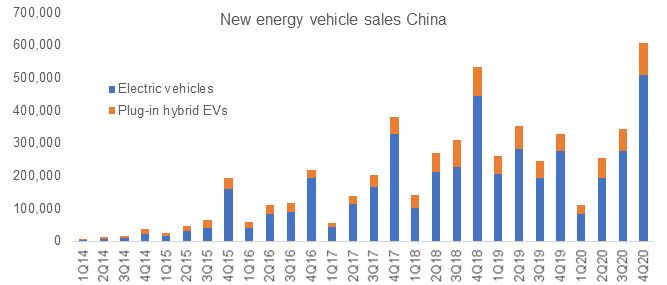China EV Industry Investment Trends Shift to Overseas Factories

China EV industry investment has dramatically shifted focus in recent years as the nation’s electric vehicle (EV) sector begins allocating more resources to overseas factories than domestic facilities for the first time ever. This shift highlights a robust competitive drive among Chinese electric vehicle manufacturers who are keen on establishing a solid footing in the global market, particularly against giants like Tesla. A staggering 74% of this investment is being directed towards battery factory investments, reflecting the critical role of the EV supply chain in this transition. As local automakers seek to navigate high tariffs and increasing competition at home, the strategy to invest abroad becomes a strategic priority for sustaining growth and enhancing global competitiveness in EVs. This evolving landscape not only showcases China’s ambitions within the electric vehicle industry but also its intricate dance with international markets and regulations.
The surge in investment from China’s electric automotive sector into international manufacturing plants marks a pivotal turning point in the global electric vehicle landscape. The prioritization of foreign establishments signals a strategic maneuver by Chinese firms to boost their presence outside their home market, aiming for greater influence in the worldwide automotive arena. This trend involves extensive allocations for construction of battery manufacturing sites, which are integral to the overarching electric mobility ecosystem. As these eastern manufacturers engage in overseas expansions, they encounter a plethora of challenges, including the scrutiny of international trade regulations and the complexities of maintaining operational efficiencies. By adapting to these competitive dynamics, Chinese brands are positioning themselves as formidable players in the global electric vehicle industry.
The Shift in China’s EV Industry Investment Trends
In an unprecedented move, China’s EV industry has shifted its investment focus, allocating more capital to overseas factories than to domestic production facilities in 2024. This shift marks a significant departure from previous years, with investments in domestic manufacturing plummeting dramatically. The transition indicates a strategic realignment as Chinese electric vehicle manufacturers bolster their global competitiveness amidst rising challenges, including stringent tariffs on exports and intensified local market competition.
The implications of this investment shift are profound, as the Chinese electric car supply chain now demonstrates a clear willingness to expand its reach beyond national borders. Investments have increasingly been targeted toward battery factory developments overseas, reflecting a strategic plan to secure critical elements of the EV supply chain in key markets. This trend not only highlights the adaptability of Chinese manufacturers but also points to an overall understanding that global competition in EVs requires foundational operations in multiple geographies.
China EV Industry Investment: Trends and Impacts
Current data from Rhodium Group suggests that China’s electric vehicle manufacturers are now favoring investments outside their home country. In that sense, 2024 marks a pivotal year where international expansion is not just a preference but a necessity. This investment trend underscores the strategic considerations OEMs (Original Equipment Manufacturers) face as they seek to navigate the global EV landscape, aiming to maintain a competitive edge against companies like Tesla.
The emphasis on foreign factories, particularly battery production facilities, suggests a long-term vision. By establishing a robust overseas presence, Chinese EV manufacturers are positioning themselves to tap into local markets more effectively and align with international regulatory trends. This not only caters to their expansion requirements but also mitigates risks associated with fluctuating domestic investments, demonstrating a balanced approach to global diversification.
Overseas Factories: A New Era for Chinese Automakers
The development of overseas factories is becoming a cornerstone for Chinese automakers looking to solidify their positions in foreign markets. Companies like Great Wall Motor and BYD are pioneering this trend by establishing production facilities in regions like South America, which significantly enhances their ability to serve local consumer bases. These strategic moves are anticipated to facilitate better market penetration and operational efficiency, vital for competing in a landscape dominated by traditional automotive giants.
Moreover, the establishment of overseas battery manufacturing plants, like that of Envision in France, not only supports local production but also reinforces the EV supply chain systemically. By localizing production closer to the market, these companies can reduce shipping times and costs while ensuring compliance with local regulations. Such developments reflect a solid commitment to maintaining competitive advantage and adapting to the ever-evolving global demand for electric vehicles.
Navigating Challenges in Overseas Investments
As promising as overseas investments appear, the path is not devoid of challenges. The Rhodium report highlights that only a quarter of the proposed foreign manufacturing projects have successfully reached completion, contrasting sharply with the healthier domestic project execution rates. Factors such as political climate, market acceptance, and regulatory frameworks abroad contribute to these complexities, raising flags regarding the sustainability of such investments.
Furthermore, increasing scrutiny from the Chinese government surrounding technology transfers and potential job losses raises additional concerns. This scrutiny suggests that future outbound investments may face stricter regulations, making it crucial for companies to remain agile and compliant with domestic and international laws to avoid detrimental repercussions. The dual necessity for growth and compliance is an intricate balancing act that Chinese EV manufacturers must navigate carefully.
The Rise of Global Competition in EVs
With the surge in investments by Chinese electric vehicle manufacturers in overseas markets, the competition in the global EV landscape is intensifying. Companies once solely focused on the domestic market are now thrust into the global arena, vying for market share against well-established players like Tesla and emerging startups. This evolution signifies that Chinese automakers are no longer participants in the global EV race; they are pivotal contenders aiming to influence worldwide EV trends.
This diplomatic competition for leadership in electric mobility also reflects the broader implications of technology dissemination and innovation on a global scale. As Chinese firms expand their reach, they bring advanced technologies and competitive pricing strategies that could reshape consumer preferences and industry standards in foreign markets. The landscape is evolving swiftly, with Chinese EV investments catalyzing changes that might redefine the very nature of automotive manufacturing and innovation.
Investment Patterns: Analyzing Domestic vs. International
The decline in domestic investment from $41 billion in 2023 to merely $15 billion in 2024 starkly illustrates the paradigm shift of Chinese EV manufacturers. The hesitation to invest domestically may be influenced by several factors, including high competition and regulatory pressures from the Chinese government. This stark contrast in investment patterns signals a call for reevaluation of strategies that focus on sustaining domestic growth amid burgeoning international opportunities.
Conversely, the slight edge in overseas investments reflects a significant strategic pivot. By investing abroad, Chinese manufacturers enhance their capabilities and strengthen their foothold in foreign markets, which in turn could yield vast returns on investment. This dynamic poses essential questions for stakeholders within the Chinese automotive sector, necessitating a thorough analysis of their operational frameworks to align with shifting investment patterns.
Significance of Battery Factory Investments Abroad
An overwhelming 74% of China’s overseas investments have been funneled into battery factories, emphasizing the critical importance of this component within the EV supply chain. The focus on battery production not only aims to meet increasing demand for electric vehicles but also seeks to establish a foothold in strategic markets where battery technology and manufacturing can deliver competitive advantages.
With the ongoing global shift towards electrification, securing resources for battery production abroad is becoming paramount. Establishing local factories reduces logistical constraints and fosters stronger ties with local economies, enabling Chinese manufacturers to align themselves with regional policies and sustainability initiatives. This approach not only enhances their competitive positioning but also supports long-term growth in a rapidly evolving industry.
Future Prospects for Chinese EV Manufacturers
As the landscape of electric vehicle manufacturing continues to evolve, Chinese manufacturers face both opportunities and challenges ahead. With significant investments directed overseas, the adaptability and resilience of these companies will be tested in new markets. Their ability to innovate and navigate complex regulatory environments will play a significant role in determining their future success in the global EV arena.
Moreover, as Chinese companies seek to enhance their global presence, building strong partnerships with local stakeholders becomes crucial. Collaboration with governments, suppliers, and technology firms can empower manufacturers to tailor their offerings effectively, aligning with the requirements of diverse consumer bases. With proactive strategies that prioritize sustainability and innovation, the future of Chinese EV manufacturers can indeed be promising, as they aim for a stellar position in the global market.
Frequently Asked Questions
What is driving the trend of Chinese electric vehicle manufacturers investing more in overseas factories?
The trend of Chinese electric vehicle (EV) manufacturers investing more in overseas factories is primarily driven by increasing global competition in EVs, high tariffs affecting exports, and a desire to gain favor with local governments in target markets. With investment abroad surpassing domestic levels for the first time, companies like Great Wall Motor and BYD are expanding their global footprint to enhance competitiveness.
How much did Chinese EV industry investment in overseas battery factories increase recently?
Chinese EV industry investment in overseas battery factories increased significantly, with 74% of this foreign investment allocated to battery manufacturing. This marks an important shift as Chinese electric vehicle manufacturers look to bolster their EV supply chain in strategic international markets.
What challenges do Chinese companies face with overseas factory investments in the EV sector?
Chinese companies face several challenges with overseas factory investments in the EV sector, including a lower completion rate of projects, with only 25% finalizing compared to 45% of domestic projects. Additionally, they encounter increasing scrutiny from the Chinese government regarding technology transfer and potential domestic job losses, which may lead to stricter regulations on outbound investments.
How does the investment pattern of Chinese electric vehicle manufacturers influence global competition in EVs?
The shift in investment patterns, with Chinese electric vehicle manufacturers focusing more on overseas factories, directly influences global competition in EVs by enhancing their ability to produce locally in key markets. This strategy allows them to bypass tariffs, reduce shipping costs, and respond more effectively to local demand, positioning them as stronger competitors against established global players like Tesla.
What impact does the drop in domestic manufacturing investments have on the Chinese EV industry?
The drop in domestic manufacturing investments from $41 billion in 2023 to just $15 billion in 2024 indicates a pivotal change in the Chinese EV industry, highlighting a strategic pivot towards maximizing returns on international investments. This shift is crucial for maintaining competitiveness as local markets become more saturated with EV options.
What significant steps have Chinese automakers taken to solidify their presence in international markets?
Chinese automakers such as Great Wall Motor and BYD are taking significant steps to solidify their presence in international markets by establishing factories abroad. Great Wall Motor opened its first factory in Brazil, while BYD expanded its production in Brazil, showcasing a robust strategy to penetrate and thrive in foreign markets despite previous challenges.
| Key Points | Investment Trends | Development of Overseas Factories | Challenges for Overseas Investments |
|---|---|---|---|
| For the first time since 2014, China’s EV supply chain invested more abroad in 2024 than domestically. | Domestic manufacturing investments dropped from $41 billion in 2023 to $15 billion in 2024, down from a peak of over $90 billion in 2022. | Great Wall Motor opened its first factory in Brazil, and BYD began production at its Brazilian factory in July 2024. | Only 25% of proposed overseas manufacturing projects have reached finalization compared to 45% for domestic initiatives. |
| An impressive 74% of overseas investment has been allocated to battery factories; assembly plants are growing as well. | Investment abroad “narrowly surpassed” domestic levels for the first time, though specific figures were not disclosed. | Chinese battery supplier Envision launched a factory in France as part of its expansion. | Projects abroad are more prone to cancellation; increasing scrutiny from Beijing on technology transfer poses risks. |
Summary
China EV industry investment has reached a significant turning point as the country’s electric vehicle manufacturers increasingly invest more in factories abroad than at home. This strategy highlights the fierce competition within the global market and reflects shifting dynamics due to local market challenges and export tariffs. As domestic investments decline, Chinese companies are focusing on international expansion to secure their place in the evolving automotive sector, though they face hurdles such as project finalization rates and regulatory scrutiny. The future of the China EV industry hinges on navigating these complexities and sustaining overseas growth.




